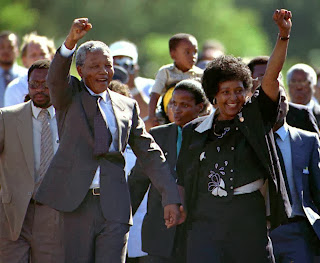Rolihlahla Mandela was born in Transkei, South Africa on 18 July 1918
and was given the name of Nelson by one of his teachers. His father
Henry was a respected advisor to the Thembu royal family.
ANC involvement
Mandela was educated at the University of Fort Hare and later at the
University of Witwatersrand, qualifying in law in 1942. He became
increasingly involved with the African National Congress (ANC), a
multi-racial nationalist movement trying to bring about political change
in South Africa.
In 1948, the National Party came to power and began to implement a
policy of 'apartheid', or forced segregation on the basis of race. The
ANC staged a campaign of passive resistance against apartheid laws.
In 1952, Mandela became one of the ANC's deputy presidents. By the
late 1950s, faced with increasing government discrimination, Mandela,
his friend Oliver Tambo and others began to move the ANC in a more
radical direction. In 1956, Mandela went on trial for treason. The court
case lasted five years, and ended with Mandela being acquitted. In the photograph below, Mandela with Oliver Tambo.
Sharpeville
In March 1960, 69 black anti-apartheid demonstrators were killed by
police at Sharpeville. The government declared a state of emergency and
banned the ANC. In response, the organisation abandoned its policy of
non-violence and Mandela helped establish the ANC's military wing
'Umkhonto we Sizwe' or 'The Spear of the Nation'. He was appointed its
commander-in-chief and travelled abroad to receive military training and
to find support for the ANC. In the photograph below, Mandela leaving after a meeting with the ANC.
On his return he was arrested and sentenced to five years in prison.
In 1963, Mandela and other ANC leaders were tried for plotting to
overthrow the government by violence. The following year Mandela was
sentenced to life imprisonment. He was held in Robben Island prison, off
the coast of Cape Town, and later in Pollsmoor Prison on the mainland.
During his years in prison he became an international symbol of
resistance to apartheid. Below, an aerial photograph of Robben Island.
Mandela became one of the most famous political prisoners of all time and appartheid started to be regarded as an infamy internationally. The song 'Free Nelson Mandela', performed by The Specials, was recorded in London and soon became very popular, especially in Africa. Unlike most protest songs, the track is upbeat and celebratory, drawing on musical influences from South Africa.
In 1990, the South African government responded to internal and international pressure and released Mandela, at the same time lifting the ban against the ANC. In 1991 Mandela became the ANC's leader. You can see a photograph of Mandela with his secon wife Winnie the day he came out of prison.
In 1990, the South African government responded to internal and international pressure and released Mandela, at the same time lifting the ban against the ANC. In 1991 Mandela became the ANC's leader. You can see a photograph of Mandela with his secon wife Winnie the day he came out of prison.
A respected global statesman
He was awarded the Nobel Peace Prize together with FW de Klerk, then
president of South Africa, in 1993. The following year South Africa held
its first multi-racial election and Mandela was elected its first black
president.
The film Invictus is a recreation of the racial tensions lived in South Africa right after Nelson Mandela became President of the nation. In the photograph below Nelson Mandela greets François Pienaar, captain of the South Africa rugby union team, the Springboks, in 1995. In the movie, their parts were respectively played by Morgan Freeman and Matt Damon.
The film Invictus is a recreation of the racial tensions lived in South Africa right after Nelson Mandela became President of the nation. In the photograph below Nelson Mandela greets François Pienaar, captain of the South Africa rugby union team, the Springboks, in 1995. In the movie, their parts were respectively played by Morgan Freeman and Matt Damon.
In 1998, Mandela was married for the third time to Graça Machel, the widow
of the president of Mozambique. Mandela's second wife, Winnie, whom he
married in 1958 and divorced in 1996, remains a controversial
anti-apartheid activist.
In 1997 he stepped down as ANC leader and in 1999 his presidency of South Africa came to an end.
In the photograph below, Mandela vists his cell in Robben Island in 1994, on the 4th anniversary of his excarceration.
In 2004, Mandela announced his retirement from public life, although
his charitable work continued. On 29 August 2007, a permanent statue to
him was unveiled in Parliament Square, London.
He died on 5 December 2013, aged 95. His funerals have been a celebration of his life by the South African people. In the following article, the pretigious Ugandan journalist Patience Akumu reflects on Mandla's legacy.
Finally, watch the obituary video released by CNN
Mandela’s name will be forever linked with the struggle against the
oppression of his people and the overcoming of the apartheid regime. His support to the Truth and Reconciliation Comission, designed to cure the wounds inflicted by appartheid, was an invitation to forget hatred and look for common ground to build up a new society.
Mandela's example and his political legacy of non-violence and
the rejection of all forms of racism will long remain an inspiration for
people around the world.














